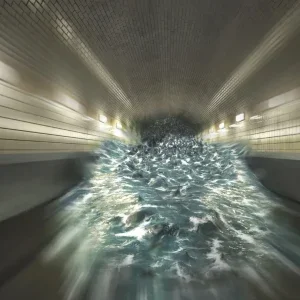
Interstate armed conflicts have historically been associated with territorial disputes, ideological differences, or resource competition. However, in the modern era, conflicts have evolved beyond conventional battlefields to include unconventional sectors such as the tunnels industry. This article delves into the intricacies of interstate armed conflicts within the tunnels industry, exploring the underlying causes, key players, and implications for global security and infrastructure development.
The Rise of Tunnel Warfare:
Tunnels have played a significant role in military strategy throughout history, from ancient sieges to modern warfare. However, in recent decades, tunnels have emerged as critical infrastructure for transportation, communication, and commerce. This increased strategic importance has made tunnels lucrative targets for both state and non-state actors seeking to gain tactical advantages or exert control over key routes.
Interstate Competition and Conflict:
Interstate competition in the tunnels industry often revolves around strategic locations, trade routes, and natural resources. Countries with extensive tunnel networks, such as Switzerland, Norway, and Japan, have become key players in global infrastructure development and transportation. However, the proliferation of tunnels has also led to intensified competition and, in some cases, armed conflict.
Case Study: The Channel Tunnel Conflict:
The Channel Tunnel Conflict serves as a compelling case study illustrating the intricate dynamics and potential consequences of interstate armed conflict within the tunnels industry. The Channel Tunnel, also known as the Eurotunnel or Chunnel, represents one of the most significant engineering feats of the 20th century, linking the United Kingdom with mainland Europe beneath the English Channel. While primarily celebrated as a symbol of European integration and economic cooperation, the tunnel has also been a focal point for tensions and disputes between France and the United Kingdom.
Historical Context:
The roots of the Channel Tunnel Conflict can be traced back to centuries of geopolitical rivalry and territorial disputes between France and the UK. Despite periods of cooperation and alliance, the two nations have a long history of conflict, including wars, colonial rivalries, and economic competition. The construction of the Channel Tunnel in the late 20th century added a new dimension to this complex relationship, raising questions of sovereignty, security, and economic interests.
Sovereignty and Security Concerns:
One of the primary sources of tension in the Channel Tunnel Conflict is the question of sovereignty and control over the tunnel complex. While the tunnel itself lies beneath international waters, its entrances and terminals are located within the territorial waters and jurisdictions of France and the UK. This dual jurisdiction has led to disagreements over issues such as border controls, immigration policies, and law enforcement responsibilities within the tunnel.
Security concerns have further exacerbated tensions between France and the UK. The Channel Tunnel represents a potential vulnerability for both countries, serving as a conduit for illegal immigration, smuggling, and security threats. Incidents such as the 1996 fire in the tunnel, which resulted in significant damage and disruption, highlighted the security risks associated with the tunnel complex and raised questions about the adequacy of security measures.
Economic Interests and Competition:
Beyond security concerns, economic interests have also played a significant role in driving conflict and competition surrounding the Channel Tunnel. The tunnel is a vital artery for trade and transportation between the UK and mainland Europe, facilitating the movement of goods, passengers, and services. Control over access to the tunnel terminals, toll revenues, and related infrastructure has therefore become a source of economic leverage and competition between France and the UK.
Disputes over tariffs, access rights, and investment in tunnel infrastructure have periodically strained relations between the two countries. Additionally, economic disparities and inequalities between regions served by the tunnel have fuelled resentment and grievances, exacerbating socio-economic tensions within both France and the UK.
Escalation and De-escalation:
While tensions between France and the UK over the Channel Tunnel have occasionally escalated into armed clashes and diplomatic standoffs, efforts to de-escalate conflict and promote cooperation have also been evident. Diplomatic channels, including bilateral negotiations and international arbitration, have been utilised to address disputes and resolve differences between the two countries.
Multilateral initiatives, such as the establishment of joint management and security protocols for the tunnel, have sought to enhance cooperation and coordination between French and British authorities. Investment in advanced technology and security measures, including surveillance systems and emergency response capabilities, has further strengthened the resilience and security of the tunnel infrastructure.
The Channel Tunnel Conflict exemplifies the complex interplay of sovereignty, security, and economic interests inherent in interstate armed conflict within the tunnels industry. While tensions between France and the UK persist, efforts to mitigate conflict and promote cooperation have demonstrated the potential for diplomatic solutions and international collaboration. As the world continues to grapple with the challenges of managing critical infrastructure in an era of geopolitical uncertainty, the lessons learned from the Channel Tunnel Conflict remain relevant for policymakers, strategists, and stakeholders involved in the tunnels industry.
Causes of Conflict:
Several factors contribute to interstate armed conflict in the tunnels industry:
1. Sovereignty and Territorial Claims: Disputes over territorial sovereignty often spill over into tunnel networks located near borders or contested territories.
2. Economic Interests: Control over key tunnel routes can provide significant economic advantages, including trade dominance, toll revenues, and access to resources.
3. Security Concerns: Tunnels are vulnerable to security threats such as terrorism, smuggling, and sabotage, prompting states to assert control and enforce security measures.
4. Technological Advancements: Advances in tunnelling technology have made it easier for both state and non-state actors to construct tunnels for military or illicit purposes, escalating tensions between rival powers.
Implications for Global Security:
Interstate armed conflict in the tunnels industry carries far-reaching implications for global security, extending beyond the immediate regions of conflict to impact international relations, economic stability, and infrastructure resilience. Understanding these implications is crucial for policymakers, security experts, and stakeholders seeking to address the complex challenges posed by tunnel warfare.
Regional Instability and Conflict Escalation:
Conflict within tunnel networks can quickly escalate, leading to wider regional instability and armed confrontation between states. Tunnels provide covert avenues for military incursions, sabotage, and asymmetric warfare, making them attractive targets for aggressive actions by rival powers. The escalation of tunnel warfare can draw neighbouring countries and international actors into the conflict, further destabilising the region and increasing the risk of broader military engagements.
Disruption of Global Trade and Commerce:
Tunnels play a vital role in facilitating global trade and commerce, serving as critical transportation arteries for goods, energy resources, and raw materials. Disruption of tunnel infrastructure due to armed conflict can have severe consequences for supply chains, trade routes, and regional economies. Closure or damage to key tunnel networks can disrupt the flow of goods, leading to shortages, price fluctuations, and economic downturns on a global scale. Moreover, the uncertainty and insecurity generated by tunnel warfare can deter investment, trade partnerships, and economic development in affected regions.
Vulnerability to Transnational Threats:
Tunnel networks are vulnerable to a wide range of transnational security threats, including terrorism, organised crime, and illicit trafficking. The clandestine nature of tunnels makes them attractive conduits for smuggling weapons, drugs, contraband, and human trafficking. Armed conflict within tunnel networks can exacerbate these security threats, providing cover for terrorist activities, insurgent movements, and criminal enterprises. The proliferation of transnational threats emanating from conflict-ridden tunnel networks poses significant challenges for global security, requiring enhanced cooperation and coordination among states and international organisations.
Environmental Degradation and Humanitarian Impact:
Conflict within tunnel networks can have severe environmental and humanitarian consequences, posing risks to ecosystems, public health, and civilian populations. Damage to tunnel infrastructure can result in pollution, contamination, and ecological destruction, endangering biodiversity and natural habitats. Moreover, armed conflict within tunnel networks can displace civilian populations, exacerbate refugee crises, and hinder humanitarian assistance efforts. The displacement of communities living near tunnel infrastructure and the disruption of essential services such as water, sanitation, and healthcare can exacerbate human suffering and humanitarian emergencies, requiring coordinated humanitarian responses and international assistance.
Proliferation of Tunnel Warfare Tactics:
The escalation of interstate armed conflict within the tunnels industry may lead to the proliferation of tunnel warfare tactics and technologies among state and non-state actors. As tunnel warfare becomes increasingly prevalent, there is a risk of its normalisation as a legitimate military strategy, challenging established norms of warfare and humanitarian law. The spread of tunnel warfare tactics could further destabilise regions prone to conflict, leading to prolonged conflicts, increased civilian casualties, and heightened humanitarian crises. Efforts to counter the proliferation of tunnel warfare tactics require enhanced international cooperation, intelligence-sharing, and capacity-building to detect, deter, and mitigate security threats posed by tunnels.
Mitigating Conflict and Promoting Cooperation:
Addressing interstate armed conflict in the tunnels industry requires concerted efforts by the international community:
1. Diplomatic Dialogue: Diplomatic channels must be utilised to de-escalate tensions and resolve disputes peacefully through dialogue and negotiation.
2. International Cooperation: Multilateral initiatives and agreements can promote cooperation in managing and securing tunnel infrastructure, enhancing transparency and trust among neighbouring states.
3. Security Cooperation: Enhanced security cooperation, intelligence-sharing, and joint patrols can help deter security threats and maintain stability within tunnel networks.
4. Infrastructure Development: Investment in resilient tunnel infrastructure and disaster preparedness measures can mitigate the impact of conflicts and natural disasters on critical transportation routes.
Conclusion:
Interstate armed conflict in the tunnels industry presents complex challenges to global security, economic stability, and infrastructure development. By addressing the underlying causes of conflict and promoting cooperation among states, the international community can mitigate the risks posed by tunnel warfare and ensure the safe and sustainable use of tunnel infrastructure for future generations.







